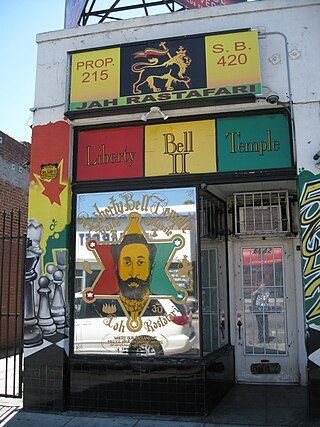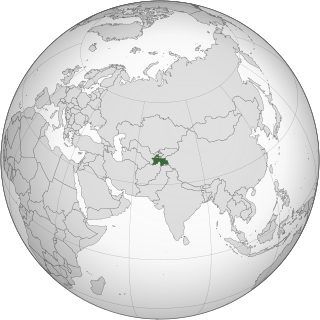Related Research Articles

The Marihuana Tax Act of 1937, Pub. L. 75–238, 50 Stat. 551, enacted August 2, 1937, was a United States Act that placed a tax on the sale of cannabis. The H.R. 6385 act was drafted by Harry Anslinger and introduced by Rep. Robert L. Doughton of North Carolina, on April 14, 1937. The Seventy-fifth United States Congress held hearings on April 27, 28, 29th, 30th, and May 4, 1937. Upon the congressional hearings confirmation, the H.R. 6385 act was redrafted as H.R. 6906 and introduced with House Report 792. The Act is referred to, using the modern spelling, as the 1937 Marijuana Tax Act. It was overturned in 1969 in Leary v. United States, and was repealed by Congress the next year.

Hemp, or industrial hemp, is a plant in the botanical class of Cannabis sativa cultivars grown specifically for industrial and consumable use. It can be used to make a wide range of products. Along with bamboo, hemp is among the fastest growing plants on Earth. It was also one of the first plants to be spun into usable fiber 50,000 years ago. It can be refined into a variety of commercial items, including paper, rope, textiles, clothing, biodegradable plastics, paint, insulation, biofuel, food, and animal feed.
Commonly-cited arguments for and against the prohibition of drugs include the following:

In the United States, the removal of cannabis from Schedule I of the Controlled Substances Act, the category reserved for drugs that have "no currently accepted medical use", is a proposed legal and administrative change in cannabis-related law at the federal level. After being proposed repeatedly since 1972, the U.S. Department of Justice initiated 2024 rulemaking to reschedule cannabis to Schedule III of the Controlled Substances Act. The majority of 2024 public comments supported descheduling, decriminalizing, or legalizing marijuana at the federal level.

Different religions have varying stances on the use of cannabis, historically and presently. In ancient history some religions used cannabis as an entheogen, particularly in the Indian subcontinent where the tradition continues on a more limited basis.

In the United States, increased restrictions and labeling of cannabis as a poison began in many states from 1906 onward, and outright prohibitions began in the 1920s. By the mid-1930s cannabis was regulated as a drug in every state, including 35 states that adopted the Uniform State Narcotic Drug Act. The first national regulation was the Marihuana Tax Act of 1937.

The use, sale, and possession of cannabis containing over 0.3% THC by dry weight in the United States, despite laws in many states permitting it under various circumstances, is illegal under federal law. As a Schedule I drug under the federal Controlled Substances Act (CSA) of 1970, cannabis containing over 0.3% THC by dry weight is considered to have "no accepted medical use" and a high potential for abuse and physical or psychological dependence. Cannabis use is illegal for any reason, with the exception of FDA-approved research programs. However, individual states have enacted legislation permitting exemptions for various uses, including medical, industrial, and recreational use.

Cannabis is a plant used in Australia for recreational, medicinal and industrial purposes. In 2022–23, 41% of Australians over the age of fourteen years had used cannabis in their lifetime and 11.5% had used cannabis in the last 12 months.

Malawian cannabis, particularly the strain known as Malawi Gold, is internationally renowned as one of the finest sativa strains from Africa. According to a World Bank report it is among "the best and finest" marijuana strains in the world, generally regarded as one of the most potent psychoactive pure African sativas. The popularity of this variety has led to such a profound increase in marijuana tourism and economic profit in Malawi that Malawi Gold is listed as one of the three "Big C's" in Malawian exports: chambo, chombe (tea), and chamba (cannabis).

Cannabis in India has been known to be used at least as early as 2000 BCE. In Indian society, common terms for cannabis preparations include charas (resin), ganja (flower), and bhang, with Indian drinks such as bhang lassi and bhang thandai made from bhang being one of the most common legal uses.
Cannabis in Namibia is illegal for recreational and medicinal uses, but cannabis, just like mandrax (methaqualone), are the most popular illicit drugs in the country. Cannabis also has a history of use as a traditional medicine by local indigenous communities. Per the 2011 UNODC report, the incidence of annual cannabis usage in Namibia was 3.9% as of 2000.
The list includes and details significant events that occurred in the global history of national-level implementations of, or changes made to, laws surrounding the use, sale, or production of the psychoactive drug cannabis.

Terms related to cannabis include:
The cannabis industry is composed of legal cultivators and producers, consumers, independent industrial standards bodies, ancillary products and services, regulators and researchers concerning cannabis and its industrial derivative, hemp. The cannabis industry has been inhibited by regulatory restrictions for most of recent history, but the legal market has emerged rapidly as more governments legalize medical and adult use. Uruguay became the first country to legalize recreational marijuana through legislation in December, 2013. Canada became the first country to legalize private sales of recreational marijuana with Bill C-45 in 2018.

The history of cannabis and its usage by humans dates back to at least the third millennium BC in written history, and possibly as far back as the Pre-Pottery Neolithic B based on archaeological evidence. For millennia, the plant has been valued for its use for fiber and rope, as food and medicine, and for its psychoactive properties for religious and recreational use.
Cannabis in Monaco is illegal. The production, sale, and possession of marijuana for medicinal or recreational purposes being a criminal offense with a penalty of up to one year in jail in addition to a fine of up to €1680. Despite the strong laws, the police and courts are often lenient, letting offenders off with a warning.
Cannabis in Djibouti is illegal with penalties for the production, sale, and possession of marijuana for medicinal or recreational purposes. Offenders may be fined or receive up to five years in prison. Use of cannabis in Djibouti is low due to poor conditions for cultivation and the local preference for the legal drug khat.

Cannabis in Tajikistan is illegal with severe penalties for the production, sale, and possession of marijuana for medicinal or recreational purposes. Punishments include up to five years in prison for possession and capital punishment or 25-year sentence for sale.
Cannabis in Equatorial Guinea is illegal with severe penalties for the production, sale, and possession of marijuana for medicinal or recreational purposes. Despite the illegality, smoking marijuana remains culturally popular among all strata of society, and it was reported in 2000 that no one has been arrested for smoking or dealing cannabis in living memory.

Cannabis in Kiribati is illegal with severe punishments for the production, sale, and possession of marijuana for medicinal or recreational purposes. A 2011 survey of young people, found that 6.8% of males and 1.6% of females had ever used cannabis.
References
- ↑ "Legal status of cannabis in Liechtenstein - Cannaconnection.com". www.cannaconnection.com. Retrieved 2020-04-14.
- ↑ World Drug Report 2011 Archived 2021-04-27 at the Wayback Machine . United Nations Office on Drugs and Crime (UNODC). Cannabis stats are from Chapter 6.1.1.3. Consumption: Annual prevalence of Cannabis, p. 217 Archived 2021-03-01 at the Wayback Machine . "Sources: Annual Reports Questionnaires, Academic Researches, Concise International Chemical Assessment Documents (CICAD), Government Reports, European School Survey Project on Alcohol and Other Drugs (ESPAD), International Narcotics Control Strategy Reports (INCSR)."
- ↑ "Bulgarian school teenagers above European average for smoking, drinking and marijuana use". The Sofia Globe. 2016-09-20. Retrieved 2020-04-14.
- ↑ "Liechtenstein Marijuana Prices, Laws, Buying & Information For Weed In Liechtenstein". www.marijuanatravels.com. Archived from the original on 2017-10-30. Retrieved 2020-04-14.
- ↑ "Farmers low at hemp ban for cows". 2005-07-20. Archived from the original on 2020-09-23. Retrieved 2020-04-14.